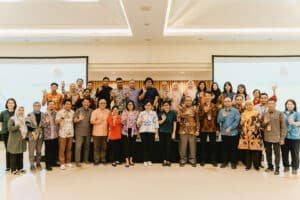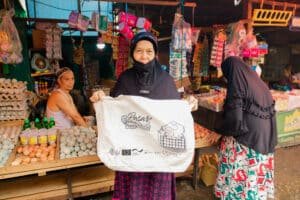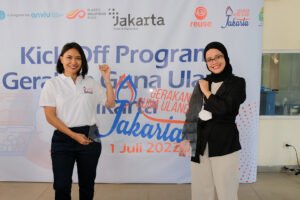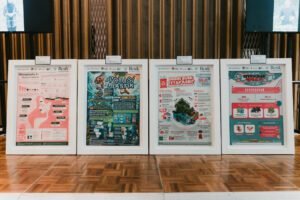Sindu Sanur Market was chosen as a pilot market for a single-use plastic-free market initiated by PPLH Bali and GIDKP. He considers this market to be one of the tourism icons based on local wisdom and because it is environmentally friendly. Apart from that, the Sindu Market was the best traditional market in Southeast Asia. Because of this predicate, it will be more complete if implemented as a single-use plastic-free market. The Head of Sindu Market welcomed this intention very much, Mr. Made Sudana, and other market administrators. He hopes to improve the quality of Sindu Market as a healthy and environmentally friendly market.
They are implementing the policy to reduce the generation of single-use plastic waste, which the Bali provincial government has launched through Governor Regulation 97 of 2018 and Denpasar City Regulation Number. 36 of 2018 still faces challenges in the traditional market sector. Traditional markets are some of the most popular shopping locations among the public because of their characteristics of selling various products, easy negotiation, easy payment, operational hours, and others. Conventional management needs help regulating traders, making traditional markets very potential contributors to single-use plastic generation.
Denpasar City has 16 traditional markets managed by PD Pasar and 34 traditional markets operated by the Denpasar City Government through the Denpasar City Industry and Trade Service (Disperindag). For almost three years, the single-use plastic reduction policy campaign has been carried out for both traders and buyers. However, because supervision is still weak and alternatives still need to be ready, there has not been a significant reduction in the use of single-use plastic.
The Indonesian Plastic Bag Diet Movement (GIDKP) is a non-governmental organization with offices in Jakarta since 2020. It has demonstrated its experience in assisting the Tebet traditional market towards a Single-Use Plastic Free Market. So, in 2021, GIDKP wants to develop a similar program in several cities, one of which is Denpasar. PPLH Bali was chosen as the collaboration partner for implementation in Denpasar. This program is a form of NGO support for the implementation of regional regulations and regional regulations regarding the reduction of single-use plastic.
To expedite the activity process, since June 2021, PPLH Bali has been coordinating with the Denpasar City Environment and Hygiene Service as the agency tasked with implementing the single-use plastic reduction policy. Apart from that, PPLH Bali also coordinated with the Head of PD Pasar Kota Denpasar, the Chairman of the Traditional Market Forum of Denpasar City, the Head of the Department of Industry and Trade of Denpasar City, and the Head of Sindu Sanur Market.
The initial stage of implementing the Single-Use Plastic Free Market pilot project at the Sindu market began with baseline research on traders’ use of single-use plastic. This activity starts from 9 – 13 October 2021. The survey method targets all traders operating at Sindu Sanur Market, totaling 104 traders.
Baseline research results on using single-use plastic in the Sindu market show that the number of small plastic bags used reached 1,575, large plastic bags 191, and bags without handles or kilo plastic reached 1,203 per day.
Meanwhile, the success rate for implementing the single-use plastic ban at Sindu Market was 43.27%. The factors that caused the program to be unsuccessful include requests for the use of plastic from consumers, the condition of the product being wet, so it requires wrapping in plastic material, and a lack of socialization from the government regarding these regulations, especially to consumers who shop at small stalls or traditional markets. Traders acknowledged that since the government intensively campaigned to reduce the use of single-use plastic in 2019, traders have greatly benefited; this is in line with the results of baseline research; as many as 82.69% of traders stated that they agreed with the ban on restrictions on single-use plastic bags. Merchandise products that are still difficult to avoid using plastic bags are wrapping canang and wet products such as fish and meat.
One of the most pronounced impacts of the return to single-use plastic consumption is the Covid-19 pandemic. According to Mrs. Wayan, one of the Sindu market management officers, “There are still many consumers who ask that every food they buy be wrapped in plastic because, according to consumers, this is more hygienic. To meet consumer demand and keep consumers shopping locally, traders must provide single-use plastic again.”

At the face-to-face opportunity in the Focus Group Discussion (FGD) room on 23 October 2021, 20 representatives of Sindu Market traders and DKLH Bali Province, DLHK Denpasar City, Head of Sindu Market, GIDKP and PPLH Bali were present. This FGD aims to explore traders’ aspirations so that the policy of reducing the use of single-use plastic can still be implemented again at Sindu Market. Traders hope that consumers will continue to be educated, traders will be given alternative environmentally friendly packaging models, the government will guarantee the availability of environmentally friendly packaging, and market management will continue to campaign through social media and audiovisuals.
Mr. Adi Wiguna, Head of the Denpasar City DLHK Waste Management Division, stated, “We are ready to support plastic-free market activities at Sindu Market. However, there is a need for cooperation and patience between business actors and consumers and continuity with existing regulations.” The same thing was also conveyed by Mrs. Sri – a representative from DKLH Bali Province; according to her, implementing this regulation is the same as adapting to new habits and health protocols during the pandemic. There needs to be awareness from within the community so that there is continuity between all parties.”








